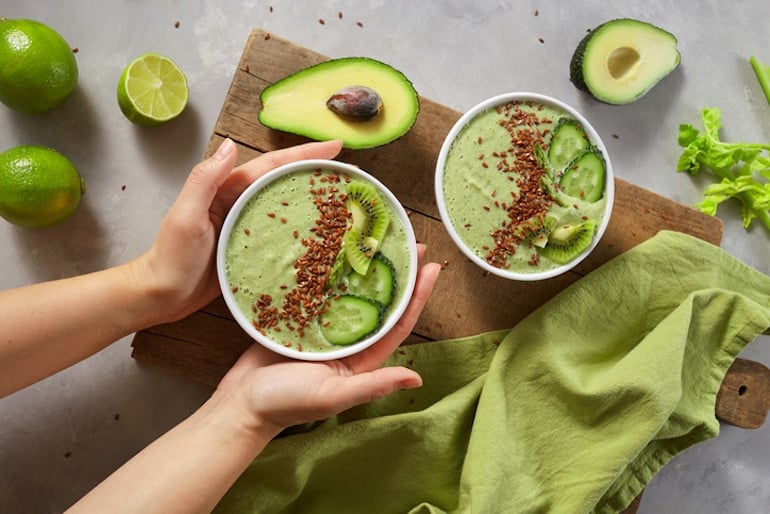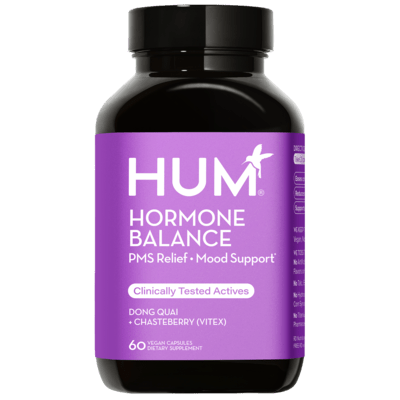Top 11 of the Best Foods for Hormone Balance
Balancing your hormones can be challenging, but there are ways in which you can optimize your hormone health through diet, exercise and stress management. In this article we are going to focus on nutrition as a substantial supporter on the path to hormone harmony.
Carrie Gabriel, MS, RDN, clues us in on the best foods to eat for hormone balance.
Hormones and Your Health
Hormones can affect your mood, stress levels, appetite, and overall health. If your hormones are off balance, we might feel more fatigued than usual. Even further, we might experience anything from irregular bowel movements to irregular menstrual cycles, heightened stress, and general irritability. Yikes!
How Diet Affects Hormones
Diet plays a crucial role in your hormone production and secretion. The nutrients in foods have the ability to positively or negatively impact your hormones. HUM’s Registered Dietician Gaby Vaca-Flores, RDN, CLE, says “nourishing your body with the right nutrients can support balanced hormones, influencing everything from energy levels to mood and metabolism. Through eating hormone-supportive foods like leafy greens, healthy fats, and lean proteins, we can take proactive steps towards balanced hormones and overall better health”. We agree.
The Link Between Food and Hormones
Many of us don’t think about turning to food first as a remedy for hormonal issues; too often, we tend to steer toward medication. And unfortunately, hormone production isn’t something we can directly control.
Hormonal balance refers to the optimal functioning of hormones in our body, impacting everything from mood to metabolism. Diet is integral to hormone health, especially by regulating your gut health (which can have an effect on your mental health). While medication can help, food is one of the most powerful tools we have for regulating hormones naturally. Thankfully, there are certain foods that can help you balance your hormones, so we can select the best foods that regulate hormones and fuel our bodies with those. Here’s everything you need to know about treating hormonal imbalance with a hormone-balancing diet and other positive health habits.
Food Groups That Help Promote Hormone Balance
Consider adding some of these hormone-friendly foods into your daily diet to keep your mind and body functioning at optimal levels.
Why Protein is Essential for Hormone Health
How Protein Helps Regulate Hormones:
Protein is extremely important for hormone balance since it influences the release of leptin and ghrelin, the hormones that control your appetite and food intake.
Carbohydrates and Their Importance for Hormone Balance
How Carbohydrates Help Regulate Hormones:
Nutrient-rich complex and high-fiber carbohydrates are ideal foods for hormone balance because they help stabilize blood sugar and reduce cortisol levels. Fiber doesn’t break down in the body, and since it doesn’t convert to sugar, fiber can’t raise blood sugar levels like other carbs can.
Why Healthy Fats are a hormone Health Must
How Carbohydrates Help Regulate Hormones:
Including high-quality natural fats into your diet can help curb not only your appetite but also insulin resistance. Several studies show that consuming healthy fat at meals can trigger the release of hormones that can help you feel satisfied.
Sings Your Hormones are Imbalanced
There are many factors that can indicate if your hormones are imbalanced. If you are concerned or have symptoms that persist or worsen, seek medical attention from a doctor.
Signs of imbalanced hormones include:
- Trouble sleeping
- Irregular periods
- Acne
- Brain fog
- Weight changes
- Hair loss
- Fatigue
11 of The Best Foods for Hormone Balance

1. Eggs
There are some myths out there about eggs and hormonal imbalance, but in actuality, eggs are one of the best foods for balancing hormones, as they have a positive impact on insulin and ghrelin hormones in the body. Specifically, insulin controls blood sugar while ghrelin controls appetite.
Your insulin and ghrelin levels are lower after you eat eggs for breakfast (compared to a carb-based meal). Similar to other proteins, eggs are one of those hormone-friendly foods that keep you full for longer, so you can end up consuming fewer calories. This aspect is particularly advantageous if you have trouble losing weight.
Key benefits for hormone balance:
- Postiive impact on insulin and gherlin
- Insulin controls blood sugar while ghrelin controls appetite
- Ghrelin levels are lower after you eat eggs for breakfast
2. Fatty Fish
According to the American Heart Association, fatty fish—such as wild-caught salmon, herring, mackerel, lake trout, and sardines—help stabilize your hunger hormones, thus helping you feel fuller for longer.
On top of that, fatty fish are considered to be one of the foods that balance hormones in females. They are rich in vitamin D, which helps improve female testosterone levels. Getting these hormonal levels under control can positively address concerns including weight gain, fatigue, and depression. A 3.5-ounce serving of such fish twice weekly can also keep your heart healthy and your skin and hair glowing.
Finally, the good fats in fish improve overall hormonal communication, which solidifies it as one of the best foods to eat for hormonal balance. The endocrine system uses hormones to communicate with the brain, which in turn boosts our mood and gives us better cognition skills.
Key benefits for hormone balance:
- Fatty fish help stabilize your hunger hormones
- Fatty fish are rich in vitamin D
- The good fats in fish improve overall hormonal communication
3. Chicken Breast
Chicken breast is high in protein and low in fat. Research indicates that high-protein diets promote the secretion of hormones such as leptin, which provides feelings of satiety. Chicken also has purported positive effects on anabolic hormones (such as insulin and estrogen) by helping build muscles after workouts, making it one of the key foods to balance female hormones.
Key benefits for hormone balance:
- Promotes the secretion of hormones such as leptin
- Provides feelings of satiety
- Purported positive effects on anabolic hormones

4. Leafy Greens
Greens like spinach, kale, collard greens, and Swiss chard are loaded with antioxidants and can help prevent inflammation. Leafy greens are also considered to be hormone-balancing foods in that they can reduce stress by lowering cortisol levels and helping balance estrogen.
Additionally, greens are high in fiber. A high-fiber diet can aid in lowering estrogen levels, particularly for people with history or risk of hormone-sensitive breast cancer, according to 2020 research by Harvard University. In general, try to consume 25 to 35 grams of fiber daily to support hormonal balance.
Key benefits for hormone balance:
- Aids in lowering estrogen levels
- Can reduce stress by lowering cortisol levels
5. Cruciferous Vegetables
Broccoli, cabbage, cauliflower, kale, and Brussels sprouts are all part of the cruciferous vegetable family and are potential foods that regulate hormones. Like leafy greens, these vegetables also help process and remove excess estrogen from the body. It’s also worth noting that the high calcium content in broccoli can aid PMS relief by reducing cramps and bloating, as well as regulating mood swings.
Key benefits for hormone balance:
- These vegetables help process and remove excess estrogen from the body, lowering cortisol levels
- The high calcium content in broccoli can aid PMS relief by reducing cramps
6. Quinoa
Quinoa is a gluten-free carbohydrate as well as a whole protein. (While quinoa is actually a seed and not a grain, it cooks and is eaten in a way that resembles whole grains.) It can be counted as one of the best foods to balance hormones by keeping female testosterone levels even. Quinoa yields this power due to its higher levels of protein that enable blood sugar stabilization. It also packs phosphorus and magnesium, which can alleviate PMS symptoms and promote sleep.
Key benefits for hormone balance:
- Keeps female testosterone levels even reducing cramps
- Due to its higher levels of protein, it can help regulate blood sugar stabilization
7. Pomegranates
Not only are pomegranates full of antioxidants but they’re also known to help block excess estrogen production. That makes it an important antioxidant-filled food that could be beneficial in the treatment of hormone-sensitive cancers, including breast cancer.
Key benefits for hormone balance:
- They’re known to help block excess estrogen production
8. Cherries
This tangy little fruit is rich in melatonin, which aids in restful sleep and itself is important for hormone balance. Cherries are also high in magnesium, which is known for its positive effects on our sleep regimens. Additionally, magnesium can help reduce cortisol and regulate adrenaline in our bodies.
Key benefits for hormone balance:
- Rich in melatonin
- High in magnesium, which is known for its positive effects on our sleep regimens
- Magnesium can help reduce cortisol

9. Flaxseeds
Flaxseeds are rich in plant-based estrogens, especially lignans, which promote hormone balance and provide menstrual support. They’re also rich in omega-3 fatty acids, antioxidants, and fiber. Fiber is an excellent probiotic, and the insoluble fiber in flaxseeds encourages bowel movements that help detox your body of excess hormones. To reap benefits from this top food for hormone balance, toss a few handfuls of flaxseeds into a smoothie or bowl of oatmeal.
Key benefits for hormone balance:
- Rich in omega-3 fatty acids
- Fiber is an excellent probiotic
- The insoluble fiber in flaxseeds encourages bowel movements that help detox your body of excess hormones
10. Avocados
Avocados are loaded with beta-sitosterol, which can positively affect blood cholesterol levels and help balance cortisol. The plant sterols in avocados also influence estrogen and progesterone, the two hormones responsible for regulating ovulation and menstrual cycles.
Key benefits for hormone balance:
- Loaded with beta-sitosterol
- The plant sterols in avocados influence estrogen and progesterone
11. Nuts
Nuts are rich in poly and monounsaturated fats, which are responsible for aiding in blood vessel health and hormone production. They positively impact your endocrine system and help lower cholesterol and insulin levels while maintaining blood sugar.
Brazil nuts are a great source of selenium, a nutrient crucial to hormone balance as it supports overall thyroid health. Next, walnuts are anti-inflammatory and rich in omega-3 fatty acids, which promote good brain health. Both walnuts and almonds are healthy sources of protein and antioxidants. They also improve your metabolism and promote naturally glowing skin. They’re great as a snack with a piece of fruit or added to a salad.
Key benefits for hormone balance:
- Rich in poly and monounsaturated fats
- Aids in blood vessel health and hormone production
- Walnuts are anti-inflammatory and rich in omega-3 fatty acids
Hormone Imbalance FAQS
What foods should you avoid when balancing hormones?
Avoid processed and fried foods, as well as sugar and alcohol.
Are there any superfoods that can help with hormones?
Leafy greens, avocados, berries, and salmon are all great superfood options for hormone health.
How do I balance my hormones as a woman?
There are many ways you can balance your hormones as a woman. Incorporating regular exercise, a balanced diet, prioritizing sleep, and taking your daily supplements are all great ways to help with your hormonal health.
What’s more important: protein, carbohydrates or fats?
Prioritize healthy fats in your diet for hormonal health. Fat is a macronutrient that helps with crucial hormones like estrogen and testosterone. Carbohydrates and protein are not to be ignored, however. Do balance these in your diet in addition to fats.
Types of Hormone-Balancing Diets
The Mediterranean Diet
This diet focuses on whole, nutrient-dense foods like fruits, vegetables, lean proteins, and healthy fats. Not only is it a delicious and satisfying way to get your nutrition, but the Mediterranean diet offers a wealth of health benefits that go far beyond simply keeping us full. It emphasizes plant-based foods such as fruits, vegetables, whole grains, and legumes. Healthy fats, especially from olive oil, are central to the diet, along with moderate amounts of fish, poultry, and dairy. Red meat and sweets are limited, while herbs and spices are used generously to flavor food without the need for excessive salt or sugar.
An Anti-inflammatory Diet
This style of eating aims to reduce inflammation in the body through foods like vegetables, nuts, seeds, olive oil, fatty fish, and berries. Drinks like coffee, green tea, and herbal teas can even help reduce inflammation in the body. On an anti-inflammatory diet it is best to avoid red meat, fried foods and refined carbohydrates.
A Low Glycemic Index diet
This diet limits carbohydrates to foods with low GI values and voids those with high GI issues. While following a GI diet it is best to avoid foods like white rice, white bread and potatoes, and embrace foods like vegetables, raw carrots, beans, and most fruits.
The Connection Between Gut Health and Hormones
If your gut microbiome is out of whack there is a good chance your hormones are too. Disruption of the gut can hormone metabolism, meaning it impacts it, and can trigger inflammation within the body. It is important to pay attention to your gut health, particularly when working on hormone health.
What Else Can You Do to Promote Hormone Balance?
There are some other ways to treat hormonal imbalances outside of diet. Here’s how to balance hormones with your overall health:
- Take care of your gut health by eating a variety of high-fiber plant foods that don’t cause you inflammation (in the form of bloating or constipation).
- Exercise regularly by moving your body in accordance with the fluctuations in your menstrual cycle—for example, doing light movements like yoga or pilates during your period and saving more high-intensity cardio workouts for other higher-energy parts of your cycle, like ovulation.
- Prioritize good quality sleep by going to bed and waking up at regular hours (getting sunlight first thing in the morning and using blue light filter glasses can help regulate your circadian rhythms).
- Manage stress as best you can, by using mindfulness practices like meditation and journaling when you do feel stressed, overwhelmed, or anxious, and seeking out mental health help where possible if you need more tools to cope with anxiety or depression.











